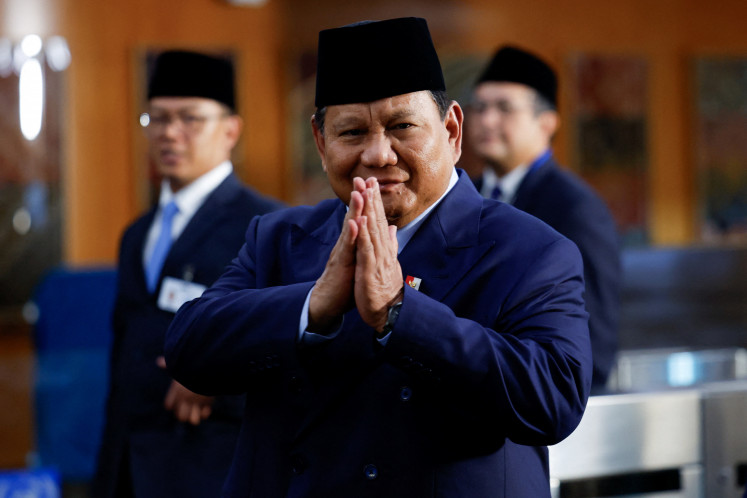Popular Reads
Top Results
Can't find what you're looking for?
View all search resultsPopular Reads
Top Results
Can't find what you're looking for?
View all search resultsIndonesia proposes joint commitment on mangrove restoration
Indonesia has invited five countries that have mangrove forests — Australia, Kenya, Mexico, Jamaica and Ghana — to make a joint commitment to restoring and rehabilitating mangroves as an effort to overcome the adverse effects of climate change, according to a ministry official
Change text size
Gift Premium Articles
to Anyone
I
ndonesia has invited five countries that have mangrove forests — Australia, Kenya, Mexico, Jamaica and Ghana — to make a joint commitment to restoring and rehabilitating mangroves as an effort to overcome the adverse effects of climate change, according to a ministry official.
The Maritime Affairs and Fisheries Ministry’s anti-illegal fishing task force led Indonesia’s delegation at the fifth Sherpa Meeting for the High Level Panel (HLP) for a Sustainable Ocean Economy in Amsterdam last week.
The HLP was initiated by Norway and consists of 14 countries: Norway, Indonesia, Australia, Canada, Chile, Fiji, Ghana, Jamaica, Kenya, Mexico, Namibia, Norway, Palau and Portugal. In addition to representing a combined 60 percent of the world’s total sea area, they also represent about 30 percent of the world’s mangrove areas.
At the event, Indonesia highlighted the importance of mangroves, which can store five times more greenhouse gas (GHG) emissions compared to terrestrial forests.
“We proposed a joint commitment of the six HLP countries to restore, rehabilitate and manage mangroves properly,” task force head Mas Achmad Santosa said as quoted in a press statement.
“When combined, the total area of mangroves owned by the six countries covers one third of the world’s mangrove areas, or around 5.4 million hectares.”
Achmad said Indonesia wanted the commitment to be included in the ocean-based climate action document, to be declared by the 14 HLP member countries at the United Nations Climate Action Summit on Sept. 23 in New York, the United States.
Indonesia has one of the world’s largest mangrove areas, with 3.5 million ha. The archipelago has the potential to mitigate the effects of climate change through mangroves.
It is estimated that around 22 percent of Indonesia’s protected mangrove forests store around 0.82 to 1.09 gigatons of GHG emissions per ha, according to anti-illegal fishing task force.
“A quarter of the world’s mangroves exist in Indonesia. Rehabilitation of mangrove forests is a priority for Indonesia and one method is through a social forestry program introduced by President Joko ‘Jokowi’ Widodo,” Achmad said.
The meeting in Amsterdam ran in parallel with the HLP Asia-Pacific Regional Sherpa Meeting in Canberra, during which Indonesia talked about the increase in Indonesia’s fish stock as a result of its marine and fisheries policy in the last five years.
Indonesia’s fish stock rose to 12.54 million tons in 2017 and 13.1 million tons in 2018, from 7.3 million tons in 2015.
According to the head of the Maritime Affairs and Fisheries Ministry’s research and human resources agency, Sjarief Widjaja, Indonesia’s war against illegal, unreported and unregulated (IUU) fishing had resulted in a 6.7 million ton increase in marine fish catch by 2018.
The number, he said, was expected to continue to increase.
“The keys to eradicating IUU fishing are national policies and strong, political support to fight illegal fishing,” he said.
“We encourage all countries to make the appropriate policies, to invest in the increasing capability of law enforcers and to take strong law enforcement measures to end IUU fishing.”










